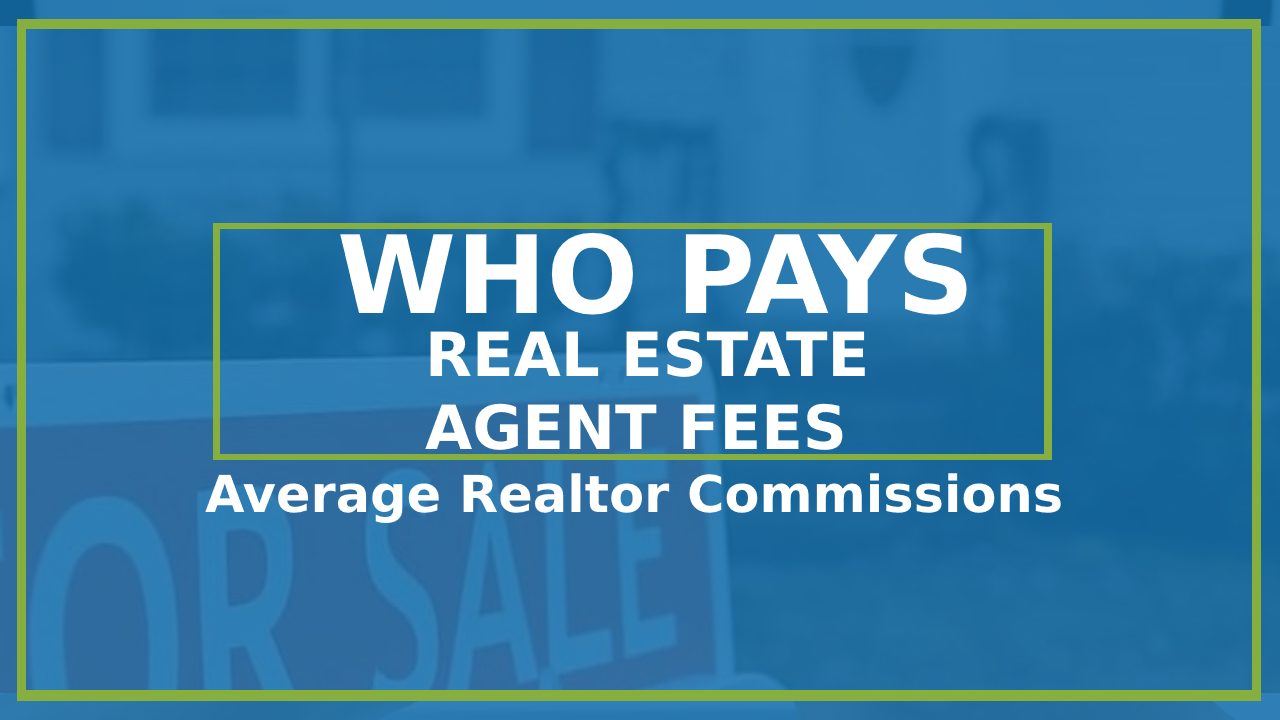Learn what fees do sellers pay when selling a house!
Finalizing a property sale can be expensive for buyers and sellers due to the closing costs they owe. For sellers, closing costs can amount to 8-10% of the home’s sale price and any debts or liens associated with the property.
One of the highest costs sellers have to bear is the realtor commissions, which can add up to 5.5-6% and are typically split between the listing and buyer agents. Additionally, some sellers may choose to cover the buyers’ closing costs, which can total 2-3%.
 Choosing a buyer’s agent with a lower commission rate can be a cost-effective way for sellers to save on closing costs. Sell My Houser offers a free agent matching service that connects you with a top-rated full-service Realtor in your area at a pre-negotiated low rate of just 1.5% of your property value, saving you thousands of dollars.
Choosing a buyer’s agent with a lower commission rate can be a cost-effective way for sellers to save on closing costs. Sell My Houser offers a free agent matching service that connects you with a top-rated full-service Realtor in your area at a pre-negotiated low rate of just 1.5% of your property value, saving you thousands of dollars.
This guide provides valuable insights into the typical closing costs for sellers, including what they are and how you can reduce some of those fees. By using intelligent strategies like shopping around for lower rates and working with a low-commission realtor, you can save thousands on closing costs and maximize your returns from the property sale.
What fees do sellers pay at closing?
When selling a home, sellers typically have to pay an avg of 9-11% of the property’s price in settlement fees, taxes, and other real estate closing costs. However, the total amount can vary depending on various elements, including state real estate tax rates, local real estate conventions, homeowners association regulations, and the purchase agreement negotiated with the buyer.
To estimate the amount owed in taxes and fees, sellers can use a seller closing costs calculator, which considers national averages but ultimately depends on the location of the sale. It’s important to note that specific fees can vary based on the state and locality and the type of closing services required by law.

who pays the realtor fees?
Sellers can learn more about specific fees and costs by referring to a detailed guide to each type of seller closing cost. By being aware of the potential costs and considering cost-saving strategies, such as working with a low-commission realtor or negotiating with the buyer who pays for closing costs, sellers can better plan and manage the expenses associated with the home sale.
Closing costs are a home sellers’ most significant expenses when finalizing a property sale. These costs include taxes, fees, and other transfer of ownership expenses of the property sale to the buyer. The average seller’s closing costs range from 8% to 10% of the home’s sale price, depending on various factors.
Realtor commission is the most significant cost sellers typically face, ranging from 5.5% to 6% of the sale price. Transfer taxes and recording fees, which state and local governments charge, usually range from 0% to 1% of the sale price. The cost of owner’s title insurance, which protects buyers and sellers in case of any legal disputes, varies from 0.1% to 0.5% of the sale price.

Find low commission real estate agents near me
Other expenses, such as escrow fees, seller’s attorney fees, property taxes, and HOA fees, can also add to the total closing cost. However, these fees vary depending on the location, local real estate conventions, and the purchase agreement with the buyer.
Sellers can work with a real estate agent who offers a lower commission rate to save money on closing costs. For instance, Sell My Houser offers a free service that matches sellers with top-rated local agents from trusted brokerages, such as RE/MAX and Century 21. Sell My Houser’s agents provide a pre-negotiated commission rate of just 1.5% of the sale price, saving sellers thousands of dollars in closing costs.
Recording fees, transfer taxes, and conveyance fees, which are associated with transferring legal property ownership to the buyer, are high closing costs that sellers should be aware of. The amount you pay for these fees may differ based on your location, and you may have to pay them to either the municipal or county government, depending on your area. The national average for real estate transfer taxes is 0.45%, while the average recording fee is 0.03%, but these percentages can vary considerably. In some places, local governments don’t charge transfer taxes; in others, these taxes can add up to 5% of the home’s sale price.
Who pays transfer taxes may also depend on local conventions and may be the seller’s or buyer’s responsibility. Furthermore, sellers must cover any outstanding property taxes, which may be prorated for the period during which the seller owned the property. For instance, if you owned the home for the 1st half of the year, you would be responsible for half of the annual property taxes, with the rest being the buyer’s responsibility. However, some local governments charge the entire yearly property tax bill to homeowners on a specific date, such as January 1st, which means that even if you sell your property early in the year, you still have to pay the entire year’s property taxes.
If you belong to an (HOA) homeowner association, you may pay prorated membership dues when you close the sale, and the details will be available in your HOA agreement.
Closing costs are a significant expense when selling a property, and they typically include transfer taxes, recording fees, owner’s title insurance, property taxes, and homeowners association fees.
Transfer taxes and recording fees are costs that are associated with transferring the property’s legal ownership to the buyer. These fees vary by location and are sometimes paid to the county or municipal government. Nationally, transfer taxes cost an average of 0.45%, while recording fees cost 0.03%, but they can be as high as 5% in some cities.
Title insurance for owners can protect the buyer from any unforeseen legal issues with the home’s title that a previous owner, such as outstanding liens or delinquent property taxes, can cause. It is usually inexpensive and costs an average of 0.16% of the sale price nationwide. The responsibility for purchasing owner’s title insurance varies by state and local conventions.
Property taxes are another expense that sellers must cover, and the amount owed is usually prorated for the part of the year in which you owned the property. However, some local governments can charge the entire annual property tax bill to whomever owns the property on a specific date. In this case, the seller would owe the whole year’s worth of property taxes, even if the property was sold early in the year.
Finally, if the property belongs to a homeowner’s association, the seller may have to pay prorated membership dues at closing. It’s important to check your HOA agreement for details.
Negotiate with the buyer.
Once you’ve hired an agent, your next chance to save on closing costs comes when negotiating with buyers. In hot housing markets, sellers have more negotiating power. You can arrange for the buyer to cover a larger share of the closing cost responsibility than buyers in your area usually pay.
Buyers will generally pay closing costs out of pocket and may have little free cash. However, there are more effective strategies for increasing your home sale profits. In most cases, it can be easier for buyers to afford a higher price than added fees for closing.
Find better rates on closing fees by shopping around.
As your closing date starts to approaches, you can shop around for lower prices on closing costs for specific areas. However, savings can be limited for the time and effort involved, especially during such a busy time in your home selling process.
When juggling inspections, repair requests, and preparing for your upcoming move, you may need more time to call a dozen settlement agencies that could save a few hundred dollars.
But if you have the energy or time, here are some verified ways to save closing fees.
Request a reissuance rate on title insurance.
Suppose you’re responsible for purchasing title insurance, and you’ve owned the property for less than ten years. In that case, you can often save on this seller closing cost by requesting a re-issuance rate. The reissue can cut the cost of title insurance by as much as 40%. Although that savings might sound wonderful, title insurance is relatively inexpensive and only adds up to about 0.06% of the home’s sale price.
Shop around for escrow services.
During most home sales, the buyer chooses the escrow company based on their agent’s or lender’s recommendation. However, sellers can find a lower-cost escrow company and ask the buyers to consider using it.
If you find an escrow service that saves 10% on the escrow fees, that ends up saving you around 0.05% of the home’s purchase price.
The cost of escrow is around 1% of the purchase price. This is typically split evenly between the buyer and seller.
Shop around for a real estate attorney.
Real estate attorneys are required in some states and are highly recommended in all areas where the transaction may be complex. Shopping around for a real estate attorney can save hundreds of dollars.
Shop around for a real estate attorney the same way you would any contractor:
- Get referrals from your agent, friends, and family.
- Check online reviews to see how others liked their services.
- Talk to each attorney about how they’re compensated (flat fee or hourly rate) and their rates.
However, there may be more effective strategies for maximizing your home sale profits. Reducing seller closing costs can be challenging, but shopping around for better rates on closing fees can help save a considerable amount of money. You can also negotiate with the buyer to cover a larger share of the closing cost responsibility than usual.
One of the ways to save on closing fees is to request a reissuance rate on title insurance if you’ve owned the property for less than ten years. This can reduce the cost of title insurance by up to 40%, but it only adds up to about 0.06% of the home’s sale price, which might be insignificant.
Another approach is to shop around for escrow services. You can compare fees from different companies to find one that offers the best rate. However, ask for a breakdown of costs, as some companies might offer lower fees but charge hidden costs that can add up.
When selling or buying a house, one of the closing costs you will encounter is the cost of escrow. This cost is typically split between the buyer and the seller and can be around 1% of the purchase price. While the buyer usually chooses the escrow company, sellers can still shop around for a low-cost option and suggest it to buyers.
Finding an escrow service that saves 20% on the fees could save around 0.1% of the home’s purchase price, which amounts to $300 on a $300,000 home.
One way closing costs can be saved is to shop for a real estate attorney. While they are required in some states, they are highly suggested in all areas where the transaction may be complex. To find a good attorney, you can get referrals from your agent, family, and friends, check online reviews, and compare rates and compensation methods (flat fee or hourly rate) for each candidate. This can save you hundreds of dollars.




